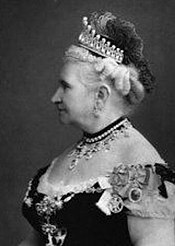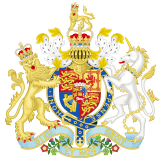Princess Augusta of Cambridge
| Princess Augusta | |||||
|---|---|---|---|---|---|
 | |||||
| Grand Duchess of Mecklenburg-Strelitz | |||||
| Tenure | 6 September 1860 – 30 May 1904 | ||||
| Born | 19 July 1822 Palace of Montbrillant, Hanover | ||||
| Died | 5 December 1916 (aged 94) Neustrelitz, Mecklenburg-Strelitz | ||||
| Burial | |||||
| Spouse | Frederick William, Grand Duke of Mecklenburg | ||||
| Issue | Frederick William, Hereditary Prince of Mecklenburg-Strelitz Adolphus Frederick V, Grand Duke of Mecklenburg-Strelitz | ||||
| |||||
| House | Hanover | ||||
| Father | Prince Adolphus, Duke of Cambridge | ||||
| Mother | Princess Augusta of Hesse-Cassel | ||||
Princess Augusta of Cambridge (19 July 1822 – 5 December 1916) was a member of the British Royal Family, a granddaughter of George III. She married into the Grand Ducal House of Mecklenburg-Strelitz and became the Grand Duchess of Mecklenburg-Strelitz.
Early life
Princess Augusta was born on 19 July 1822 at the Palace of Montbrillant, Hanover. Her father was Prince Adolphus, Duke of Cambridge, the seventh son of George III and Charlotte of Mecklenburg-Strelitz. Her mother was Princess Augusta of Hesse-Cassel. The young princess was christened at the same palace on 16 August 1822, by Rev Edward Curtis Kemp (Chaplain to the British Ambassador to the Court of Berlin, The Rt. Hon. Sir George Rose). Three of her godparents were present at the christening:
- Princess Caroline, Landgravine Frederick of Hesse-Kassel (her maternal grandmother)
- Princess Louisa of Nassau-Usingen (presumably her maternal aunt)
- a Princess Louisa, a Landgravine of Hesse, being her maternal aunt either by marriage or blood
The rest were not present, possibly being represented by proxies:
- The Duke of York (her paternal uncle)
- all of her six living paternal aunts (by blood)
- The Electress of Hesse (wife of Wilhelm II, her mother’s cousin)
- The Grand Duchess of Mecklenburg (her maternal aunt)
- Princess Charlotte, Landgravine William of Hesse-Kassel (wife of her maternal uncle)[1]
The Princess spent her earlier years in Hanover, where her father was the viceroy on behalf of his brother, George IV.
Princess Augusta had one brother, Prince George, later 2nd Duke of Cambridge; and one sister, Princess Mary Adelaide, later Duchess of Teck. As such, Princess Augusta was a first cousin of Queen Victoria and aunt to Mary of Teck, later consort of George V.
Marriage
On 28 June 1843, Princess Augusta married her first cousin, Frederick William of Mecklenburg-Strelitz, at Buckingham Palace, London. (The two were also second cousins on their fathers' side.) Upon marriage, Augusta became HRH The Hereditary Grand Duchess of Mecklenburg-Strelitz and, on 6 September 1860, HRH The Grand Duchess of Mecklenburg-Strelitz following the death of her father-in-law.
The marriage of the Grand Duke and Grand Duchess produced two children:
- Frederick William, Hereditary Prince of Mecklenburg-Strelitz (born and died in London, 13 January 1845)
- Duke Adolphus Frederick of Mecklenburg-Strelitz (22 July 1848 – 11 June 1914); succeeded his father as Adolphus Frederick V in May 1904.
Later life
Although she spent most of her adult life in Germany, the Grand Duchess Augusta retained close personal ties to the British Royal Family. She frequently visited her mother, the Duchess of Cambridge, at her Kensington Palace apartments.
After her mother's death in 1889, the Grand Duchess acquired a house in London's Buckingham Gate area, where she spent a portion of the year until advanced old age made it impossible for her to travel abroad.
In making preparations for the coronation of King Edward VII and Queen Alexandra in 1901, the Duke of Norfolk consulted her on matters of etiquette and attire. This was due to her presence at the Coronation of King William IV and Queen Adelaide seventy-one years earlier. She was nine years old at the time and kissed the Queen's hand. She was also able to provide details of the Coronation of Queen Victoria, for which no written records existed (she was then sixteen).
The Grand Duchess of Mecklenburg-Strelitz was particularly close to her niece, the future Queen Mary. However, old age prevented her from attending the Coronation of King George V (who was her first cousin twice removed; i.e., George III was her grandfather, whereas he was the great-great-grandfather of George V) and Queen Mary at Westminster Abbey on 22 June 1911.
Following the outbreak of World War I, the British Government suspended the pension she had been receiving as a member of the British Royal Family.[2] During the war, the Swedish Embassy passed letters from the Queen to her aunt, who still lived in Germany.
As an elderly lady, she was known for being cantankerous. She was also known as being quite shrewd and intelligent. In his book, Queen Mary (London, 1959), the Queen's official biography, James Pope-Hennessy reports that the Queen's Aunt Augusta was not fond of the new science of photography, fearing it would intrude deeply into the private lives of Royal personages; at pp. 101-105 he offers a masterly sketch of this formidable lady.
The Dowager Grand Duchess of Mecklenburg-Strelitz died in Neustrelitz and was buried in Mirow. As the longest-lived grandchild of George III, she was the last link to the British branch of the House of Hanover.
At the time of her death, she was 94 years, 4 months and 16 days old, making her the longest-lived British Princess of the Blood Royal until Princess Alice, Countess of Athlone, a male-line granddaughter of Queen Victoria, broke the record in 1977. Princess Alice died aged over 97 years old.
Titles, styles, honours and arms
Titles and styles
- 19 July 1822 – 28 June 1843: Her Royal Highness Princess Augusta of Cambridge
- 28 June 1843 – 6 September 1860: Her Royal Highness The Hereditary Grand Duchess of Mecklenburg-Strelitz
- 6 September 1860 – 30 May 1904: Her Royal Highness The Grand Duchess of Mecklenburg-Strelitz
- 30 May 1904 – 5 December 1916: Her Royal Highness The Dowager Grand Duchess of Mecklenburg-Strelitz
As the male-line granddaughter of a King of Hanover, Princess Augusta also bore the titles of Princess of Hanover and Duchess of Brunswick and Lunenburg
Ancestors
References
- ^ Yvonne's Royalty Home Page: Royal Christenings
- ^ "Princess loses pension" (PDF). New York Times. 19 September 1914. Retrieved 2007-10-24.

